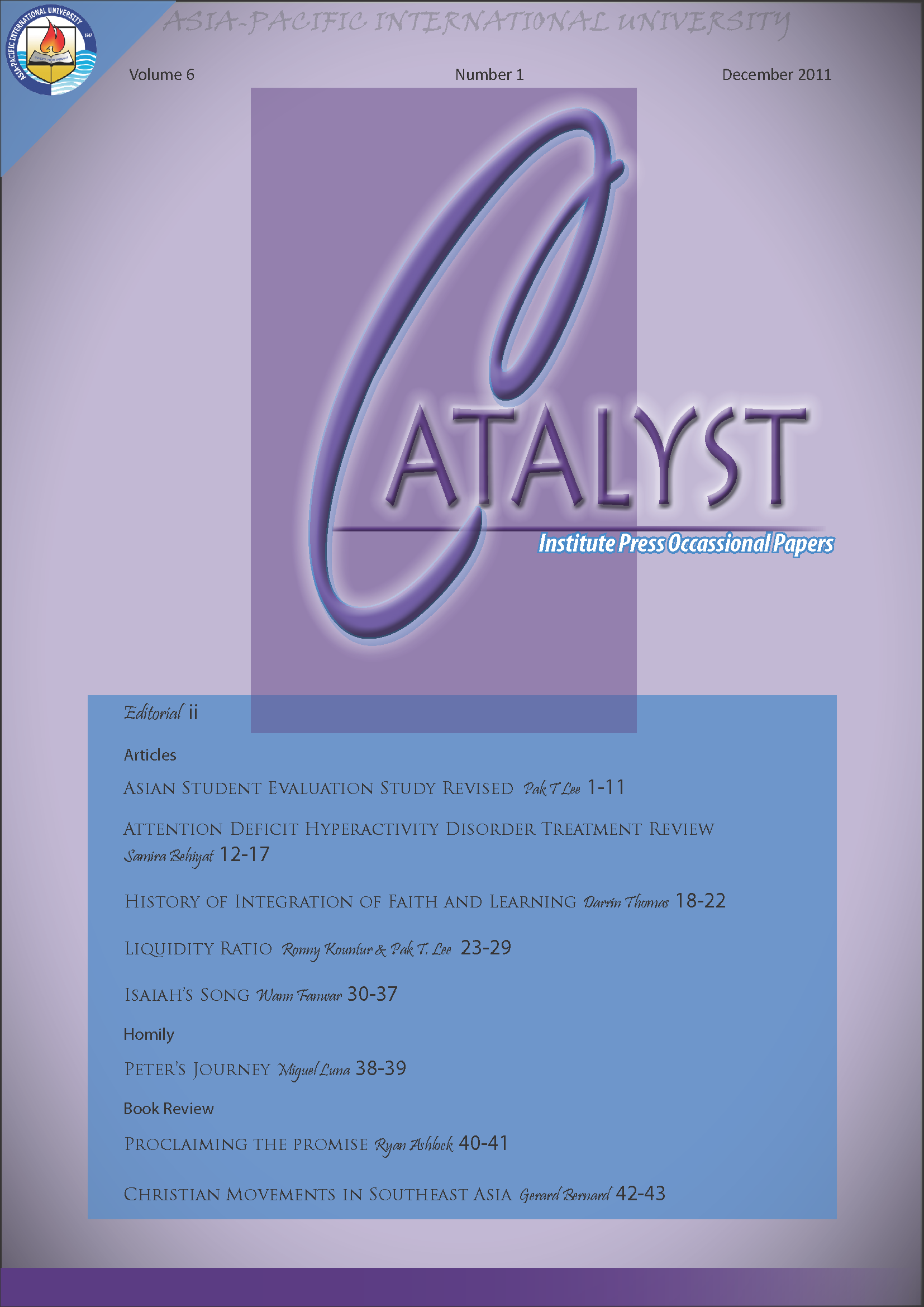Asian Students’ Views on Course, Instrument, and Faculty Evaluation
Main Article Content
Abstract
The subject of student evaluation of faculty and courses at the undergraduate level is very controversial. Many studies have been carried out on student evaluation over the years with little or no consensus. In fact they generated controversy and debate. This study attempts to identify the views of Asian students relating to course and faculty evaluation and the factors that they perceive influence their evaluation of courses and teachers in an environment where students and faculty live on the same campus, where they have more interactions with each other, compared with non-residential education institutions. The findings are mixed and divided with the agreement that course and faculty evaluations are important but with little agreement on factors that influence their evaluation of them.
Article Details

This work is licensed under a Creative Commons Attribution-NonCommercial-NoDerivatives 4.0 International License.
Copyright: Asia-Pacific International University reserve exclusive rights to publish, reproduce and distribute the manuscript and all contents therein.
References
Aleamoni, L.M. 1999 Student Rating Myths Versus Research Facts from 1924 to 1998. Journal of Personnel Evaluation in Education. 13(2), pp.153 – 166.
Best, J. B., and Addison, W. E. 2000 A preliminary study of perceived warmth of professor and student evaluations. Teaching of Psychology, 27, pp. 60-62.
Casey, R. J., Gentile, P., and Bigger, S. 1997 Teaching appraisal in higher education: An Australian perspective. Higher Education, 34(4), pp. 459482.
Chacko, T.J. 1983 Student ratings of instruction: a function of grading standards. Educational Research Quarterly. 8, pp. 19 – 25.
Chambers, B. A., & Schmitt, N. 2002 Inequity in the performance evaluation process: How you rate me affects how I rate you. Journal of Personnel Evaluation in Education, 16, pp. 103-112.
Centra, J.A. 1993 Reflective faculty evaluation. San Francisco. CA. Jossey-Bass.
Cohen, P.A. 1981 Student Rating of Instruction and Student Achievement: A Meta-Analysis of Multisection Validity Studies. Review of Educational Research. 51, pp. 281-309.
D’Apollonia, Sylvia and Philip C. Abrami 1997 Navigating Student Ratings of Instruction. American Psychologist. 52. pp. 1198 – 1208.
Darling-Hammond, L., Wise, A.E., and Pease, S.R. 1983 Teacher evaluation in organizational context: A review of literature. Review of Educational Research. 53, pp. 285 – 328.
Ellis, L., Burke, D.M., Lomire, P., and McCormack, D.R. 2003 Students Grades and Average Ratings of Instructional Quality: The Need for Adjustment. Journal of Educational Research. 97 (1), pp. 25-40.
Greenwald, A.G. and Gerald, M.G. 1997 Grading Leniency Is a Removable Contaminant of Student Ratings. American Psychologist. 11, pp. 1209 -1217.
Haefele, D.L. 1992 Evaluating teachers: An alternative model. Journal of Personnel Evaluation in Education, 7(1), pp. 21 – 31.
Heckert, Theresa, 2006 Relations among Student Effort, Perceived Class Difficulty Appropriateness, and Student Evaluation of Teaching: Is it Possible to “Buy” Better Evaluation Through Lenient Grading? College Student Journal. Volume 40, Issue 3, pp. 588 – 596.
Heine, P. and Maddox, N. Nd. Student Perceptions of the Faculty Course Evaluation Process: An Exploratory Study of Gender and Class Differences :www.aabri.com/manuscripts/09192.pdf
Iyamu, E.O.S. and Aduwa-Oglebaen, S. E. 2005 Lecturers perception of student evaluation in Nigerian Universities. International Education Journal 6(5), pp. 619 – 625.
Jacobs, L.C. 1987 University Faculty and Students’ Opinions of Student Ratings. Indiana Studies in Higher Education. No. 55 (Bloomington, IN, Bureau of Evaluation and Testing, Indiana University).
Kulik, J.A. and McKeachie, W.J. 1975 The Evaluation of Teachers in Higher Education. Review of Research in Education. 3, pp. 210 – 240.
Kulik, J. A., and Kulik, C. C. 1974 Student ratings of instruction. Teaching of Psychology, 1, 51-57.
Marsh, H.W. and Dunkin, M.J. 1992 Students’ evaluation of university teaching: A multidimensional perspective. In: J. C. Smart (ed) Higher Education: Handbook of Theory and Research, Vol. 8. pp.143 – 233.
Marsh, H.W., and Roche, L.A. 1997 Making students’ evaluations of teaching effectiveness effective. American Psychologist. 52 (11), pp. 1187 – 1197.
Marsh, H. W. 1980 The influence of student, course, and instructor characteristics in evaluations of university teaching. American Educational Research Journal, 17, pp. 219-237. 1984 Students’ evaluations of university teaching: Dimensionality, reliability, validity, potential biases, and utility. Journal of Educational Psychology, 76, pp. 707-754. 1987 Students evaluation of university teaching: Research findings, methodological issues, and
directions for future research. International Journal of Educational Research. 11, pp. 253 – 388.
Mason, K.H., Edwards, R.R., and Roach, D.W. 2002 Student Evaluation of Instructors: A Measure of Teaching Effectiveness or of Something Else? Journal of Business Administration Online. Vol. 1 No. 2. Retrieved from: www.atu.edu/business/jbao/Fall2002/ mason_edwards_roach.pdf
Maurer, Trent. 2006 Cognitive Dissonance or Revenge? Student Grades and Course Evaluation. Teaching of Psychology. Volume 33, Issue 3 pp.176 – 179.
McKeachie, W.J. 1997 Student Ratings: the validity of use. American Psychologist. 52 (11), pp. 1218 – 1225.
Naftulin, D.H., Ware, J.E., and Donnelly, F.A. 1973 The Doctor Fox lecture: A paradigm of educational seduction. Journal of Medical Education. 48, pp. 630635.
Ryan, J.J., Anderson, J.A., and Birchler, A.B. 1980 Student evaluation: the faculty responds. Research in Higher Education. 12, pp. 317-333. Vasta, R.
Sarmiento, R.F. 1979 Liberal grading improves evaluations but not performance. Journal of Educational Psychology. 71, pp. 191-211.
Senior, B.A. 2000 Student Teaching Evaluation: Options and Concerns. Journal of Construction Education. Vol. 5, No. 1, pp. 20-29.
Simpson, P. M., and Siguaw, J. A. 2000 Student evaluations of teaching: An exploratory study of the faculty response. Journal of Marketing Education, 22(3), pp. 199-213.
Wachtel, H.K. 1998 Student evaluation of college teaching effectiveness: A brief review. Assessment and Evaluation in Higher Education. 23 (2), pp. 191 – 211.


